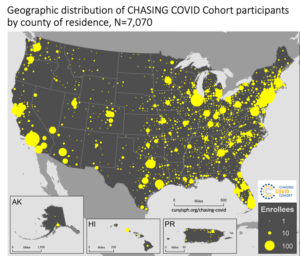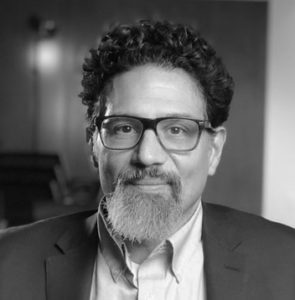For immediate release.
In response to the COVID-19 pandemic, the CUNY Institute for Implementation Science in Population Health (ISPH) and the CUNY Graduate School of Public Health and Health Policy (CUNY SPH) have launched the Communities, Households and SARS/COV-2 Epidemiology (CHASING) COVID study.
The study team moved quickly to enroll a prospective cohort of >7,000 individuals using internet-based strategies. The cohort represents a geographically and socio-demographically diverse sample of the adult U.S. population: 23 percent of participants were 60+ years at enrollment, 24 percent are Black or Hispanic, and 52 percent are men. At least 24 percent of participants are frontline workers, either in healthcare or other essential employees such as police, first responders, people in food services or transportation. All fifty U.S. states are represented, as well as the District of Columbia, Puerto Rico, and Guam.
“To our knowledge, this is the only national cohort study focused on the coronavirus pandemic,” said ISPH Executive Director and Distinguished Professor of Epidemiology and Principal Investigator of the CHASING COVID study, Dr. Denis Nash. “We believe the knowledge generated will be critical for those responding to this pandemic but also to inform the response to future pandemics.”
CHASING COVID study participants will be contacted every month for at least six months to assess actions that people may take to slow the spread of the pandemic, COVID-19 symptoms, testing and diagnosis, preparedness, and economic and social impact, among other outcomes. Dried blood spot specimens will be self-collected at home by participants and returned via mail at month one and month three and stored for antibody testing when a validated serologic test is available.
“We need to understand the impact of the public health response to control the coronavirus pandemic, and this study will rapidly contribute to our understanding and allow us to monitor changes over time,” said Dr. McKaylee Robertson, the study’s lead author and CUNY ISPH investigator.
To assess how public health efforts such as physical distancing regulations impact the pandemic, the study team will integrate publicly available county-level data on population mobility, diagnoses, and deaths with the cohort study data. The longitudinal design allows for prospective estimation of the incidence of COVID-19, using antibodies to the novel coronavirus.
“Physical distancing regulations are already being relaxed, and they will be followed by enhanced testing and subsequent contact tracing and quarantine,” said Nash. “By rapidly deploying specimen collection for serologic tests, we will be able to characterize the effectiveness and impact of public health strategies that may be critical to controlling and mitigating the SARS-CoV-2 pandemic, as well as future pandemics.”
Learn more about the CHASING COVID study and sign up for study updates at https://cunyisph.org/chasing-covid.
About the Institute for Implementation Science in Population Health at the City University of New York
The CUNY Institute for Implementation Science in Population Health (ISPH) was founded on the notion that substantial improvements in population health can be efficiently achieved through better implementation of existing strategies, policies, and interventions across multiple sectors. We study how to translate and scale-up evidence-based interventions and policies within clinical and community settings in order to improve population health and reduce health disparities. CUNY ISPH. Pursuing population health gains through better implementation. cunyisph.org. Follow us on Twitter: @CUNYISPH.
About the CUNY Graduate School of Public Health and Health Policy
The CUNY Graduate School of Public Health and Health Policy (CUNY SPH) is committed to teaching, research, and service that creates a healthier New York City and helps promote equitable, efficient, and evidence-based solutions to pressing health problems facing cities around the world. For more information, visit sph.cuny.edu. Follow us on Twitter: @CUNYSPH.
“A national prospective cohort study of SARS/COV2 pandemic outcomes in the U.S.: The CHASING COVID Cohort,” McKaylee Robertson, Sarah Kulkarni, Amanda Berry, Chloe Mirzayi, Andrew Maroko, Rebecca Zimba, Drew Westmoreland, Christian Grov, Angela Parcesepe, Levi Waldron, and Denis Nash for the CHASING COVID Cohort (C3) Study. medrRxiv, May 4, 2020.
NB: This study has not yet been peer reviewed.
For more information contact:
Barbara Aaron
Director of Communications
[email protected]











